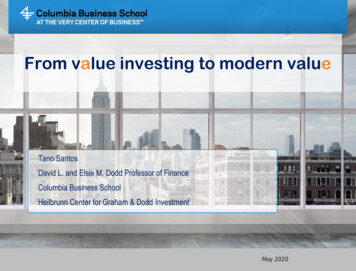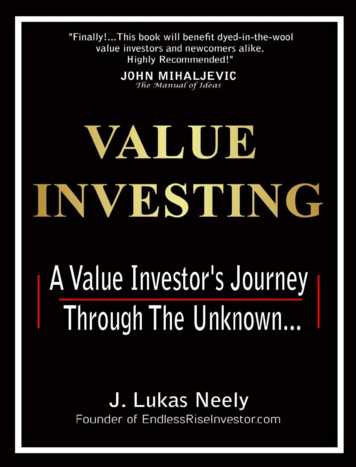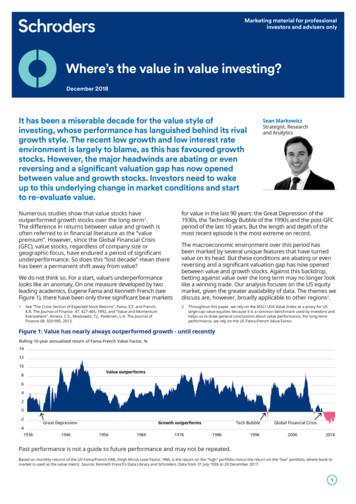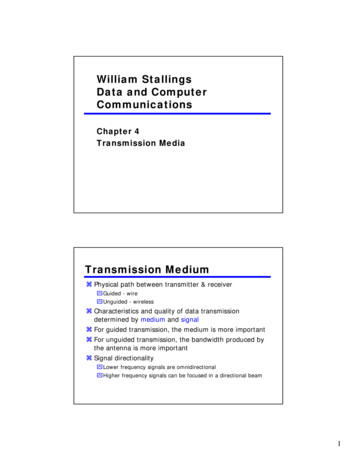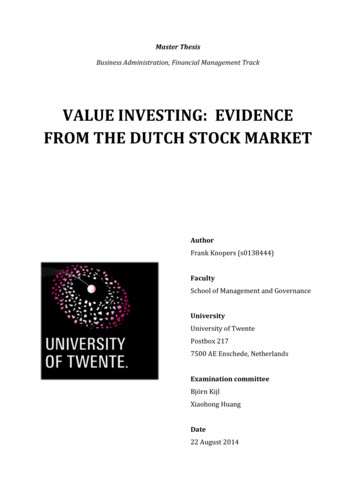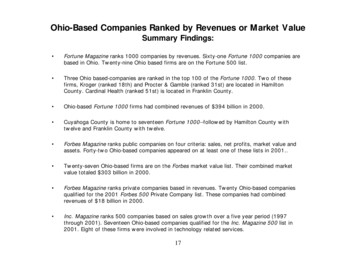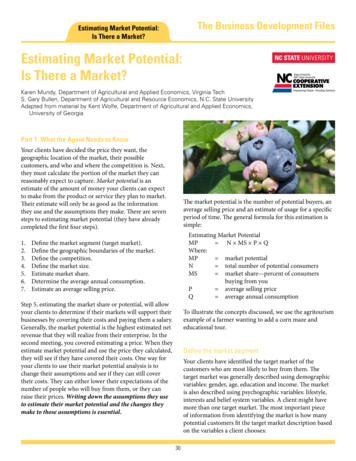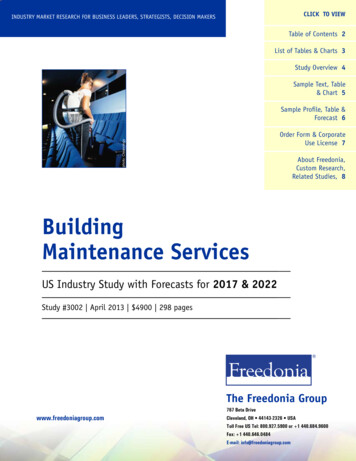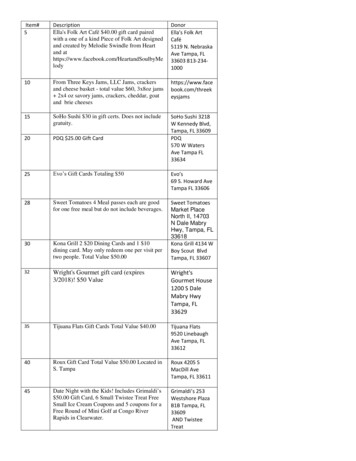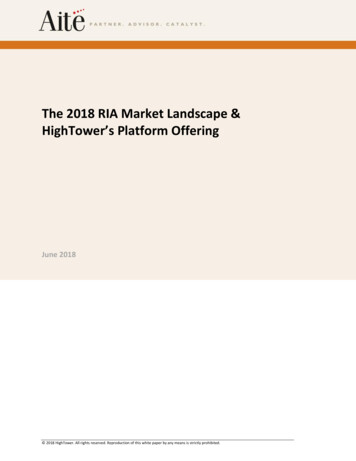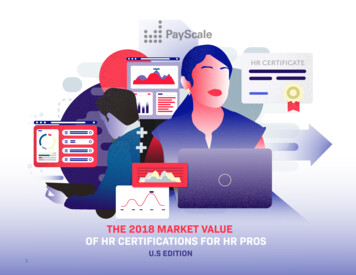
Transcription
HR CERTIFICATETHE 2018 MARKET VALUEOF HR CERTIFICATIONS FOR HR PROSU.S EDITION1
IntroductionIn the HR profession, getting an HR certification is generally seen asa good way for HR pros to learn new skills and competencies, earnmore and move up in their careers. But just how much value do thesecertifications hold?To find out, PayScale collected salary and demographic informationfrom over 102,000 respondents who completed our online salarysurvey. These respondents have HR job titles and 34 percent reportedthat they have at least one HR certification. We analyzed the impactof various HR certifications on compensation and career trajectory forHR professionals in the U.S. For the study, we evaluated 10 distinct HRcertifications from four HR membership organization.For this study, we evaluated 10 distinct certifications from four HRmembership organizations including SHRM, HRCI, World at Work andthe Institute for Professional Excellence in Coaching.To determine the impact HR certifications have on compensation andcareer advancement for HR pros in the U.S., we looked at the datasetthrough a number of lenses. First, we built a statistical model to estimatethe pay boost one can expect from having a particular HR certification,while controlling for other factors that impact compensation such asjob title, industry and location.2www.payscale.comIn addition, we evaluated the median pay for HRpros with and without certifications, the percentpay boost of having a certification by metropolitanareas and by industry. Also, we examined howmuch compensation grew for HR certificationholders over the last decade. Last but not least, welooked at the promotion velocity for those with HRcertifications vs. those without.We found that for the most part, having an HRcertification is beneficial from a pay perspectiveand a career advancement perspective.Below, we present the key findings.
Type Of HR CertificationsHRCIHRCI - The HR Certification Institute - has been offering HR certifications for over 40years. It’s well recognized in the HR community: More than 500,000 HR professionalsin more than 100 countries have earned certifications from HRCI. HRCI offers severaltypes of certifications: The Professional in Human Resources (PHR)Senior Professional in Human Resources (SPHR)Associate Professional in Human Resources (aPHR)California Professional in Human Resources (PHR-CA), for those practicing HR in CaliforniaCalifornia Senior Professional in Human Resources (SPHR-CA), for those practicing HR inCalifornia Global Professional in Human Resources (GPHR)3www.payscale.com
SHRMSHRM - The Society for Human Resource Management - is the largest HRmembership organization focused on professional development. It has supportedmore than 100,000 employers representing 140 million employees worldwide.In 2014, SHRM launched a new, “competency-based” certification program for HRprofessionals to give them another option for learning and professional development.According to SHRM’s website, the SHRM certification provides practitioners with “jobrelevant” knowledge, and skills that are transferable across industries, geographicborders, job responsibilities and career levels. Certifications are also “focused onadvancement”, “strategic”, accredited by the Buros Center for Testing, and backed bySHRM, the world’s largest HR membership organization.SHRM offers just two types of certifications: SHRM Certified Professional (SHRM-CP) SHRM Senior Certified Professional (SHRM -SCP)When SHRM rolled out their own certifications, they allowed existing HRCIcertification holders to map their old certifications over to the new SHRM options.4
World at WorkWorld at Work is the leading nonprofit professional association in compensation andtotal rewards. They provide professional development for those who design and delivertotal rewards programs. World at Work’s most popular certification is the CertifiedCompensation Professional (CCP).Institute for Professional Excellence inCoaching (iPEC)The iPEC is one of the largest ICF-accredited coaching training schools in the world, it hashelped over 15,000 graduates launch careers as Certified Professional Coaches. It offersthe Certified Professional Coach (CPC) credential.5www.payscale.com
?% Of HR Professionals With At Least OneCertification?50.0%45.0%40.0%Who’s Getting HRCertifications?In 2018, we found that 34.2 percent ofall HR professionals have at least oneHR certification.35.0%30.0%25.0%20.0%15.0%The prevalence of HR certificationshave steadily declined from 2008 to2014, but it’s then picked up in the last4 years. A big part of this has to dowith SHRM, which started to offer itsown certifications (the SHRM-CP andSHRM-SCP) in 12012201320142015201620172018
Which HR Certifications Are MostPrevalent in 2018?HRCI certifications are most prevalent in 2018. In fact, 30.4 percentof HR professionals in our dataset have at least one certificationfrom HRCI. This makes sense, as HRCI has been offering HRcertifications for over 40 years.Certifications% of HR ProsHas at least one certification36.4%Professional in Human Resources (PHR)16.9%SHRM Certified Professional (SHRM-CP)15.4%Senior Professional in Human Resources (SPHR)7.9%SHRM Senior Certified Professional (SHRM-SCP)5.3%Associate Professional in Human Resources (aPHR)0.7%Global Professional in Human Resources (GPHR)0.3%Certified Compensation Professional (CCP)0.2%California Senior Professional in Human Resources (SPHRCA)0.1%California Professional in Human Resources (PHR-CA)0.1%7The most popular HR certification to get from the HRCI isthe Professional in Human Resources (PHR) certification;16.9 percent of HR professionals who responded to oursurvey in 2018 said they have this certification.The second most popular HR certification is SHRM”sCertified Professional certificate (SHRM-CP); 15.4 percentof all HR professionals who responded in our survey in2018 said they have this.The Senior Professional in Human Resources (SPHR) is thethird most popular certification (this requires someone toalready have the PHR); 7.9 percent of all HR professionalswho answered our survey in 2018 said they have this. TheSHRM-SCP was just a little bit behind, with 5.3 percent ofall HR professionals saying they have this in 2018.In the last several years, we’ve seen that SHRMcertifications have become increasingly popular. In 2018,we saw that nearly as many HR professionals reportedhaving the SHRM-CP as the PHR from HRCI.
HR Certifications By Career LevelsHigher level HR professionals are more likely to have an HR certification. Whileonly 13.2 percent of HR administrators have at least one HR certification, 35.5percent of HR managers are certified and 51.1 percent of Vice Presidents of HRare certified.55.7%Chief Human Resources Officer (CHRO)51.5%Vice President (VP), Human Resources (HR)46.5%Human Resources (HR) Director35.5%Human Resources (HR) Manager28.3%Human Resources (HR) Generalist13.2%Human Resources (HR) Administrator5.2%Human Resources (HR) Assistant0%810%20%30%40%50%www.payscale.com60%
Does It Make Sense to HaveMultiple HR Certifications?It is not uncommon for HR professionals to have multipleHR certifications. Some choose to get the more senior-levelcertification that follows the initial one. Others have gottencertifications from different certifying organizations. Certain pairs ofHR certifications are fairly common:50% of SHRM Certified Professionals (SHRM-CP) also have a Professionalin Human Resource (PHR) certification offered by HRCI.62.5% of SHRM Senior Certified Professionals (SHRM-SCP) also have aSenior Professional in Human Resources (SPHR) certification from HRCI.41.8% of Global Professional in Human Resources (GPHR) certificationholders also have a SPHR certification (both offered by HRCI).50% of Certified Professional Coach (CPC) certification holders also have aSPHR (offered by HRCI).14.1% of PHR (offered by HRCI) certification holders also have a SHRM-CP9
How HR Certifications Impact PayHow does having an HR certification influence pay?How much does it vary by certification?For the most part, HR certifications do give HR professionals a boost inpay. But the amount of the pay boost varies significantly depending on theparticular certification, industry, work location, and job level.To determine that a pay boost can be attributed to having a particularcertification and not other compensable factors, we used a statistical modelto isolate the effect of HR certifications on pay among several HR jobs. Wecontrolled for location, job survey response year, company size, years ofexperience and whether or not two certifications might be more valuabletogether.Using this approach, we determined statistically significant measures of“percent pay boost”, which estimates the effect of having a particularcertification on an individual’s pay.In other words, when we look at two people who have similar profiles, theperson with a particular certification can expect to see an X percent payboost compared to the person without this certification.10www.payscale.com
Several Types of HRCertifications Gave WorkersSignificant Pay BoostsThe CPC, GPHR, and SPHR-CA gave certification holdersa double digit boost in pay. Those who have the CertifiedProfessional Coach (CPC) certificate saw the highestboost in pay (28.8 percent), followed by those who havethe Global Professional in Human Resources (GPHR, 16percent).We also found that those with a SHRM-CP, SHRM-SCP,HRCI’s PHR and SPHR can expect a pay boost, albeit amore incremental one.Meanwhile, we did not have enough aPHR or PHR-CAcertification holders in our dataset to be able to makeconfident estimates about pay boosts for these twotypes of certifications.11CertificationsOrganizations% of PayBoostCertified Professional Coach (CPC)iPEC28.0%Global Professional in Human Resources (GPHR)HRCI16.0%California Senior Professional in HumanResources (SPHR-CA)HRCI14.3%Certified Compensation Professional (CCP)WaW9.7%Senior Professional in Human Resources (SPHR)HRCI9.6%SHRM Senior Certified Professional (SHRM-SCP)SHRM5.7%SHRM Certified Professional (SHRM-CP)SHRM3.9%Professional in Human Resources (PHR)HRCI2.9%*All results in this table are statistically significant.It’s important to note that there are prerequisites to getting the more “senior”certifications, including prior certifications and prior work experience inHR. So, the employee profile of someone who has a Senior Professionalin Human Resources (SPHR) is different from the profile of someone whohas a Professional in Human Resources certification (PHR). However, we’veincluded job title and years of experience in our regression model to makethe estimates of pay boost as comparable as possible.www.payscale.com
Pay Boost Associated With Certification Holders(Based on Median TCC)HR Certifications AreGaining Value Over TimeOver the last 10 years, HR certificationshave become increasingly valuable to HRprofessionals from a pay perspective and acareer acceleration perspective.In 2008, the percent boost in pay associatedwith having any HR certification was 17 percent.The percent pay boost has climbed up and up,reaching close to 40 percent in 2016 beforedropping slightly in the last two years. In 2018,the percent boost in pay associated with havingan HR certification is 31.6 18 0k 10k 20k 30k 40k 50k 60kAny Certification12www.payscale.com 70k 80kNo Certifications
A Closer Look at Pay Boosts When we looked at each type of certification individually, wefound that with the exception of the aPHR, all certification typesled to a boost in pay for those who have it.In addition, most certifications showed an upward trend wherethe percent pay boost increased year over year.Because SHRM only started to offer certifications in 2015,we felt that there weren’t enough years for clear trends onpay boost over time. We found that the median SHRM-CPcertification holder reaped a 22.8 percent pay boost in 2018compared to someone who has no certifications. The medianpaid SHRM-SCP holder saw a 89.1 percent boost in pay in 2018.Pay Increases as CertificationLevel IncreasesAs for specific certifications, median pay increases by 54percent from a SHRM-CP certification to SHRM - SCPcertification. We looked at the median total cash compensationfor people who responded to our survey in 2018.13SHRM -CPMedian pay - 70,000SHRM-SCP Median pay - 107,800Median pay increases by 50 percentfrom a PHR certification to a SPHRcertification.PHR Median pay - 72,000SPHRMedian pay - 108,000Those with a GPHR make even more. These certificationholders have a median pay of 155,000.
AnyNoCertificationCertificationCertifications% Pay BoostHuman Resources (HR) Manager15.8% 69,500 60,000Human Resources (HR) Administrator15.5% 50,000 43,300Human Resources (HR) Director12.5% 90,000 80,000Human Resources (HR) Assistant11.6% 39,500 35,400Human Resources (HR) Generalist9.0% 54,500 50,000Vice President (VP), Human Resources (HR)-4.1% 140,000 146,000Chief Human Resources Officer (CHRO)-11.9% 163,000 185,00014www.payscale.comCertifications HelpBoost Pay, but OnlyUp to a PointHaving a certification can help youincrease your pay early and midcareer, until you get to the directorlevel. Once you’re at the directorlevel, certifications do not yieldan incremental boost in pay. Webelieve it’s likely that higher level HRprofessionals have gained enoughpractical experience that they nolonger reap benefits from renewingtheir certifications. So, they’ve allowedtheir HR certifications to expire.
HR Certifications Help WithCareer ProgressionHaving an HR certification positively influences an HRpro’s chances of being promoted, and this holds true forevery job level. However, certifications matter most inthe earliest phase of an HR pro’s career.% Receiving Promotions in 5 YearsJobsHuman Resources(HR) AssistantHuman ResourcesFor each job title, we looked at the percentage of peoplereceiving promotions in 5 years.(HR) AdministratorHuman ResourcesGetting a HR certification matters a lot at the HRassistant level: of certified professionals in this entry-levelrole, 82 percent report they have been promoted in thelast five years, versus just 68 percent of those who aren’tcertified. It’s interesting to note that certifications alsoincrease the chances that an HR director would receivea promotion (we saw a 25 percent increase in odds ofpromotion at this job title level).(HR) GeneralistHuman Resources(HR) ManagerHuman Resources(HR) DirectorWithoutCerfificationsWith at Least One% Increase in Odds ice President(VP), HumanResources (HR)*The “Percent Increase in Odds of Promotion” metric is the percent effect of having anycertification on promotions. The 24.8 percent value for HR directors means having anycertifications increases the probability of having been promoted in the past five years by24.8 percent.15www.payscale.com
Percent Pay Boost For Certification Holders(Based on Median TCC)Which Industries Pay HRCertification Holders the Most?Not all industries value HR certifications the same. Healthcare,Retail & Customer Service and Accommodation & FoodServices value HR certification holders the most. These arethe industries where HR certification holders saw the highestpercentage boosts in pay. Meanwhile, Technology, Nonprofits,Engineering & Science value HR certifications the least.Next, we looked at particular certifications to see whichindustries paid these certification holders the best.16Healthcare38.3%Retail & Customer Service34.6%Accomdation & Food Services33.3%Transportation & Warehousing32.1%Education30.9%Arts, Entertainment, & Recreation30.8%Construction30.4%Finance & Insurance29.8%Manufacturing29.7%Average29.5%Energy & Utilities27.7%Real Estate & Rental/Leasing26.8%Angencies & Consultancies25.4%Engineering & cale.com
SHRM CertificationsAll up, SHRM-CP certification holders see the largest boosts in pay in Healthcare (27.7 percent), Retail & Customer Service (26.9 percent)and Accommodation & Food Services (23.8 percent). These certification holders see smallest boosts in pay in Finance & Insurance (13.9percent), Engineering & Science (13.8 percent), Agencies & Consultancies (13.8 percent) and Technology (10.8 percent).Meanwhile, SHRM-SCP certification holders see the largest boosts in pay in Healthcare (90.6 percent), Real Estate & Rental and Arts(90.0 percent) and Entertainment & Recreation (85.0 percent). These certification holders see the smallest boosts in pay in Energy &Utilities (55.4 percent), Construction (56.4 percent) and Nonprofits (61.5 percent).Percent Pay Boost For Certification Holders (Based on Median TCC)Accommodation & Food ServicesAgencies & ConsultanciesArts, Entertainment, & RecreationConstructionEducationEnergy & UtilitiesEngineering & ScienceFinance & InsuranceHealthcareManufacturingNonprofitsReal Estate & Rental/LeasingRetail & Customer ServiceTechnologyTransportation & Warehousing0%20%40%60%SHRM Senior CertifiedProfessional (SHRM-SCP)17www.payscale.com80%100%SHRM CertifiedProfessional (SHRM-CP)
HRCI CertificationsPHR certification holders see the largest boosts in pay in Healthcare (27.7 percent), Retail & Customer Service (25.0 percent) andAccommodation & Food Services (22.1 percent). These certification holders see the smallest boosts in pay in Technology (11.5 percent),Finance & Insurance (14.8 percent) and Engineering & Science (15.3 percent).Meanwhile, SPHR certification holders see the largest boosts in pay in Real Estate & Rental (83.8%), Arts, Entertainment & Recreation(79.4 percent) and Retail and Customer Service (73.1 percent). These certification holders see the smallest boosts in pay in Nonprofits(55.6 percent), Agencies & Consultancies (50.2 percent) and Energy and Utilities (56.1 percent).Percent Pay Boost For Certification Holders (Based on Median TCC)Accommodation & Food ServicesAgencies & ConsultanciesArts, Entertainment, & RecreationConstructionEducationEnergy & UtilitiesEngineering & ScienceFinance & InsuranceHealthcareManufacturingNonprofitsReal Estate & Rental/LeasingRetail & Customer ServiceTechnologyTransportation & Warehousing0%20%40%60%Senior Professionalin HR (SPHRP)18www.payscale.com80%100%Professional in HR(PHR)
Which Cities PayHR CertificationHolders theMost?We looked at pay for 50 MetroAreas to see where HR certificationholders can earn the most. HRcertifications are particularlyvaluable in California; thesecertification holders earned morethan 20,000 more than thosewithout certifications.These are the five metro areaswhere having a certificate boostspay the most:5 Metro Areas Where HR Certifications Have The Most Impact On Pay 100k 80k 60k 40k 20k 0kRiverside-SanSan Jose-SunnyvaleBernardino-Ontario, -Santa Clara, CaliforniaCaliforniaColumbus, OhioSan Diego-Carlsbad Salt Lake City, Utah-San Marcos, CaliforniaAny Certification19www.payscale.comNo Certifications
5 Metro Areas Where HR Certifications Have Least Impact On Pay 80k 70kHR certifications were not asvaluable from a pay perspectivein Detroit, Michigan, FortLauderdale, Florida, SuffolkCounty, New York, Fort Worth,Texas or Newark New Jersey.These are the five metropolitanareas where having HRcertifications have the leastimpact on pay. 60k 50k 40k 30k 20k 10k 0kDetroit-Livonia-Dearborn, MichiganFort Lauderdale-Pompano Beach-DeerfieldBeach, FloridaSuffolk CountyNassau County,New YorkFort Worth-Arlington, TexasAny Certification20www.payscale.comNewark-Union,New Jersey /PennsylvaniaNo Certifications
SummaryThere are clear, quantifiable benefits to obtaining HR certifications.The degree to which becoming certified impacts pay and careerprogression for HR pros varies among job levels, geographies,industries and the specific certification. But ov
membership organizations including SHRM, HRCI, World at Work and the Institute for Professional Excellence in Coaching. To determine the impact HR certifications have on compensation and career advancement for HR pros in the U.S., we looked at the dataset through a number o
